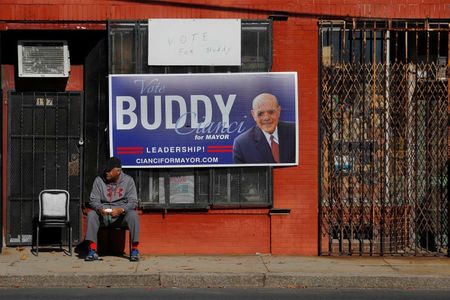By Hilary Russ
(Reuters) - In Rhode Island, the next governor could be a Democrat preferred by Wall Street or a Republican favored by rank-and-file union members.
"It's upside down politics in Rhode Island now," said Wendy Schiller, associate professor of political science at Brown University.
The strange situation stems largely from a divisive battle over public pension benefits and a more mundane question that's normally the pragmatic purview of public finance geeks: bond payments.
The race pits Democrat Gina Raimondo, Rhode Island's current Treasurer and a former venture capitalist, against Republican Allan Fung, the mayor of Cranston, a city of 80,500 residents southwest of Providence.
Polls had shown Raimondo in the lead. But the latest from Brown put the two contenders in a statistical tie, with each at about 38 percent.
While in office, Raimondo spearheaded one of the most far-reaching pension reforms in the United States. Public sector labor unions sued, and the case is set for trial after the police union scuttled a settlement in April.
The benefit cuts and other overhauls aimed to shore up the pensions, funded at just 49 percent in fiscal 2010, among the lowest of all U.S. states.
If the state loses in court, the next governor would face a huge bill. It could cost the state at least $220 million annually to pay down an extra $2.5 billion in unfunded liabilities, state data showed.
"The loss... would be quite catastrophic," said John Simmons, executive director of the Rhode Island Public Expenditure Council.
Fung also boosted his city's pension system by striking a deal with unions, though his changes weren't as sweeping.
While Raimondo won endorsements from some union heads, her tough stance on pensions may have lost her votes from workers. Fung led Raimondo 42 - 30 percent among union households, according to an early October poll by WPRI-TV and The Providence Journal.
Currently, Florida-based Cumberland Advisors doesn't own any Rhode Island general obligation debt. John Mousseau, director of fixed income at Cumberland, said he "would look much more favorably upon it" if Raimondo gets elected.
The candidates also differ on whether the state should repay $75 million of bonds it backed in 2010 for ex-Red Sox Pitcher Curt Schilling's video game company.
The company went bankrupt, putting taxpayers on the hook for bond payments. Credit rating agencies warned that if Rhode Island doesn't repay bondholders, they would slash the state's rating.
That would cause higher borrowing costs - anywhere from $26.3 million over 10 years to $260.4 million over 20 years, state budget officials said.
Raimondo says the state must make payments to avoid long-term fiscal penalties. Fung, however, says he would not make the payments because taxpayers should not have to "bail out" investors.
But the decision would not be up to the next governor alone. State lawmakers decide whether to allocate payments in their annual spending plan, which the governor signs.

House Speaker Nicholas Mattiello, a conservative Democrat, backed the payment of the 38 Studios bonds.
(Reporting by Hilary Russ; Additional reporting by Megan Davies; Editing by David Gregorio)
